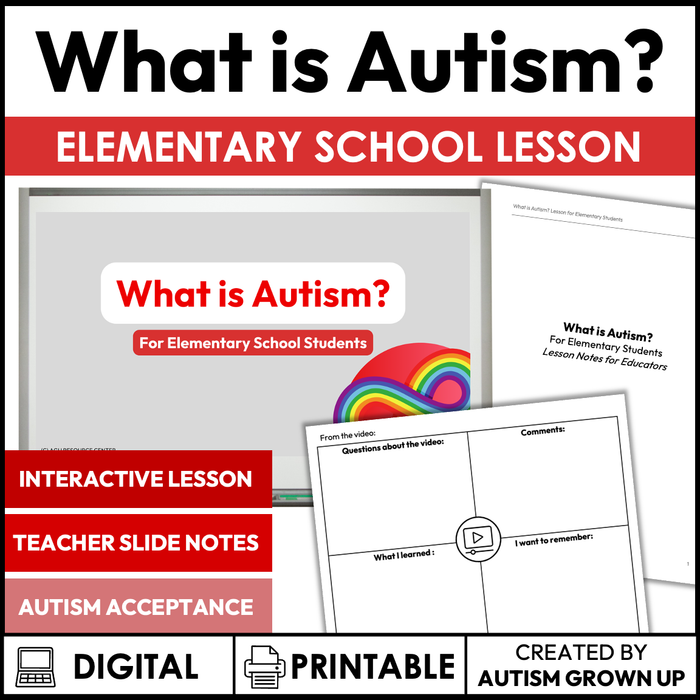
What is Autism? | For Elementary School | Autism Acceptance Month
Original price
$7.00
-
Original price
$7.00
Original price
$7.00
$7.00
-
$7.00
Current price
$7.00
Digital download
This is a digital download, no physical items will be sent to you. You will see the download as either a PDF or zip file.
This Autism lesson is created with all students in mind. Our goal is to help you create a positive learning environment and supportive classroom community. Part of that work is talking about differences, needs, and how we can best support each other. This lesson is another way to discuss differences in how we think, communicate, and work with each other (one of the fundamentals in neurodiversity-affirming support!).
Note that this is created for elementary school-aged students. We would recommend this for upper elementary (Grades 3-5) as the best fit.
Objective:
To provide an up-to-date lesson on autism for students to be used around Autism Acceptance month or other times of the year.
▶️ What's Inside:
Resource Guide
-
About the Resource
-
Resource Preparation
-
Resource Walkthrough
Interactive Slide Deck
-
30+ slides
-
Editable 1 slide template provided to match template & theme
-
Google Slides™
-
PowerPoint™
Lesson Video (+ 2 min video)
-
Provided in the Zip File
-
mp4 video
-
Links to online version as well
Teacher Lesson Notes
-
Printable PDF
-
Editable version
-
Google Docs™
-
Microsoft Word™
Student Worksheets
-
Printable PDF
-
Accompany the lesson (2 levels)
-
Extended quiz activity after the lesson (4 levels)
▶️ Suggested Uses:
While you can use this lesson resource in a variety of ways in the classroom and/or community programming, some suggested uses are included below:
-
Autism Acceptance Month lesson
-
Focus on Autism lesson
-
Part of lessons around neurodiversity
-
Peer support or peer-mediated instruction and intervention training
-
Character and community lesson
-
Social emotional learning lesson
-
Social skills lesson
▶️ What to Expect:
Information and priorities sourced from Autistic people we support and collaborate with as an organization, needs reported around inclusion and language, and in research articles about what educators and classmates should know about autism.
Photos of elementary-aged children so students can see themselves and their peers with age-respectful language and images.
Information about the autism spectrum and how each person is different and unique.
Identity-first language (this is an autism community preference; we do emphasize the importance of individual preferences so if an Autistic individual prefers person-centered language for them, this is to be respected as well!)
You can email us at hello@autismgrownup.com if you have any feedback, questions, and/or requests for resources.







